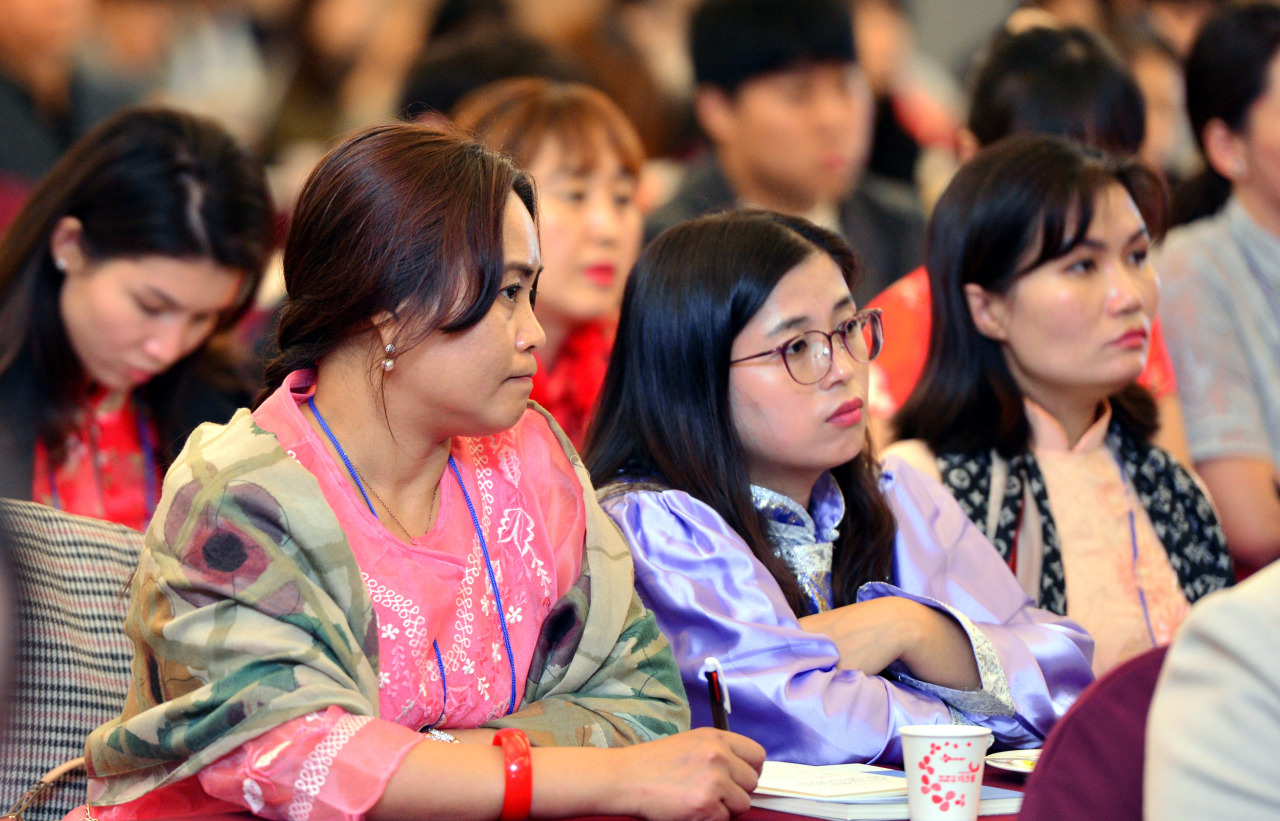[ASEAN-Korea summit] Multiculturalism binds Korea, ASEAN region
By Im Eun-byelPublished : Nov. 26, 2019 - 16:14
Busan -- As the ASEAN-ROK Commemorative Summit got underway in Busan, a conference on multicultural families in South Korea was held Tuesday.
The Ministry of Gender Equality and Family and the Korean Institute for Healthy Family co-hosted the 2019 Multicultural Families Network Conference at the Busan Tourism Organization Arpina on Tuesday.
More than 100 people attended the event to share their opinions on Korea’s multiculturalism policies, including multicultural families and experts.
“Korea has become a multicultural society at a fast rate. There have been trials and errors, but also the will to rectify them,” Gender Equality and Family Minister Lee Jung-ok said at the conference. “I hope people here can nurture creativity and energy for the future based on diversity. We will become a ministry that respects cultural diversity.”
The Ministry of Gender Equality and Family and the Korean Institute for Healthy Family co-hosted the 2019 Multicultural Families Network Conference at the Busan Tourism Organization Arpina on Tuesday.
More than 100 people attended the event to share their opinions on Korea’s multiculturalism policies, including multicultural families and experts.
“Korea has become a multicultural society at a fast rate. There have been trials and errors, but also the will to rectify them,” Gender Equality and Family Minister Lee Jung-ok said at the conference. “I hope people here can nurture creativity and energy for the future based on diversity. We will become a ministry that respects cultural diversity.”

Kim Hye-yeong, CEO of KIHF, said Korea has supported multicultural families through policy initiatives for more than 10 years. The institution runs Multicultural Family Support Center branches across the nation, providing educational services and networking events for multicultural families. The center was launched in 2006 with 21 branches across the nation. Today, there are 219.
EK Vongvathany, a counselor at the Embassy of Cambodia, who was present at the event, pointed out that a large number of migrant women in Korea are victims of domestic violence. Also, they face harsh discrimination, she said, requesting that the ministry offer help for more migrant women.
Minister Lee delivered a presentation about the past, present and future of multicultural family policy in Korea.
“After the Korean War, Korean people migrated to other countries, such as Germany, to earn money. But now, foreigners are coming here, making Korea a multicultural society,” Lee said.
“The ministry will look at the policies related to multicultural families and see if there are discriminatory aspects,” she said. “Everyone who lives in Korea is Korean. Korea should be where people can dream of a better future.”
The speech was followed by a session on multicultural family success stories. One example was a migrant woman from Cambodia who graduated from the Multicultural Mom’s School run by the Multicultural Family Support Center. The school helps migrant women communicate with their children more effectively.
Another example was the Chiem Volunteers Club, which helps migrant women settle in Korea. The club also helps local farmers through volunteer activities.
Experts who help multicultural families integrate into Korean society were present too. Park Ji-hyun of the Korea Center for United Nations Human Rights Policy arranges predeparture orientation programs for marriage migrants. Jang Hun-sung, the director of the Multicultural Family Support Center of North Gyeongsang Province, organizes volunteer teams, helping migrant women network and visit their home countries to perform community work.
The event wrapped up with a Multicultural Family Participation Council Meeting. Cambodian-born Korean billiards star Sruong Pheavy was present at the meeting as a council member.
By Im Eun-byel (silverstar@heraldcorp.com)




![[Herald Interview] 'Amid aging population, Korea to invite more young professionals from overseas'](http://res.heraldm.com/phpwas/restmb_idxmake.php?idx=644&simg=/content/image/2024/04/24/20240424050844_0.jpg&u=20240424200058)






![[Hello India] Hyundai Motor vows to boost 'clean mobility' in India](http://res.heraldm.com/phpwas/restmb_idxmake.php?idx=644&simg=/content/image/2024/04/25/20240425050672_0.jpg&u=)








